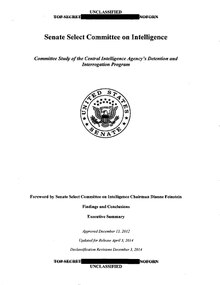
The Committee Study of the Central Intelligence Agency's Detention and Interrogation Program[1] is a report compiled by the bipartisan United States Senate Select Committee on Intelligence (SSCI) about the Central Intelligence Agency (CIA)'s Detention and Interrogation Program and its use of torture during interrogation in U.S. government communiqués on detainees in CIA custody. The report covers CIA activities before, during, and after the "War on Terror". The initial report was approved on December 13, 2012, by a vote of 9–6, with seven Democrats, one Independent, and one Republican voting in favor of the report and six Republicans voting in opposition.[2][3]
The more-than 6,700-page report (including 38,000 footnotes)[4] details the history of the CIA's Detention and Interrogation Program and the Committee's 20 findings and conclusions. On December 9, 2014, the SSCI released a 525-page portion that consisted of key findings and an executive summary of the full report. It took more than five years to complete.[5][6] The full unredacted report remains classified.[7][8][9]
The report details actions by CIA officials, including torturing prisoners, providing misleading or false information about classified CIA programs to the President, Department of Justice, Congress, and the media, impeding government oversight and internal criticism, and mismanaging the program. It also revealed the existence of previously unknown detainees, that more detainees were subjected to "enhanced interrogation techniques" (widely understood to be a euphemism for torture) than was previously disclosed, and that more techniques were used without Department of Justice approval. It concluded that the use of enhanced interrogation techniques did not yield unique intelligence that saved lives (as the CIA claimed), nor was it useful in gaining cooperation from detainees, and that the program damaged the United States' international standing.[1]
Some people, including some CIA officials and U.S. Republicans, disputed the report's conclusions and said it provided an incomplete picture of the program. Others criticized the publishing of the report, citing its potential for damage to the U.S. and the contentious history of its development. Former Republican presidential nominee John McCain praised the release of the report. Upon the report’s release, then-President Barack Obama stated, "One of the strengths that makes America exceptional is our willingness to openly confront our past, face our imperfections, make changes and do better."[10]
In the wake of the release of the report's Executive Summary, a large number of individuals and organizations called for the prosecution of the CIA and government officials who perpetrated, approved, or provided legal cover for the torture of detainees;[11][12][13][14][15] however, prosecutions are considered unlikely.[16] The U.S. has also passed legislation, sponsored by Senators McCain and Dianne Feinstein, to prevent U.S. agencies from using many of the torture techniques described in the report.[17]
The 2019 film The Report covers the decade-long time period that led to the final creation and publication of the report.[18]
- ^ a b Cite error: The named reference
TheReportItselfwas invoked but never defined (see the help page). - ^ "The history of the CIA detention and interrogation program". Los Angeles Times. December 9, 2014. Retrieved April 9, 2021.
- ^ "Minority views published by the SSCI" (PDF). Archived from the original (PDF) on December 9, 2014. Retrieved June 15, 2015.
Minority Views on to SSCI Study of the Central Intelligence Agency's Detention and Interrogation Program (mirror)
{{cite web}}: External link in|quote= - ^ Feinstein, Dianne (December 9, 2014). "Remarks made by Senator Dianne Feinstein on the Senate floor regarding the committee's report". feinstein.senate.gov. Retrieved August 30, 2019.
- ^ Spencer Ackerman (December 9, 2014). "CIA's brutal and ineffective use of torture revealed in landmark report". The Guardian. Retrieved December 9, 2014.
- ^ "Fact Check: Intelligence Committee Did Not Spend $40 Million on CIA Study". feinstein.senate.gov. December 10, 2014. Retrieved August 30, 2019.
- ^ Lauren Hodges (December 8, 2014). "Congress Clashes Over Release of CIA Torture Report". NPR News. Retrieved December 8, 2014.
- ^ Spencer Ackerman (August 5, 2014). "Top senator rejects CIA torture report redactions ahead of public release". The Guardian. Retrieved December 8, 2014.
- ^ Rhodan, Maya (December 9, 2014). "Here's What Dianne Feinstein Said About the Torture Report". Time Magazine. Retrieved December 9, 2014.
- ^ Mufson, Steven (December 9, 2014). "Obama, on new interrogations report: 'Some of the actions taken were contrary to our values'". Washington Post. Retrieved April 16, 2015.
- ^ "No More Excuses: A Roadmap to Justice for CIA Torture". hrw.org. Human Rights Watch. December 2015. Retrieved December 2, 2015.
- ^ Cite error: The named reference
Bloomberg2was invoked but never defined (see the help page). - ^ Cite error: The named reference
BBCwas invoked but never defined (see the help page). - ^ Cite error: The named reference
Torture Fight Set Back by U.S. Failure to Prosecute, U.N. Official Sayswas invoked but never defined (see the help page). - ^ Cite error: The named reference
NYT Editorial Boardwas invoked but never defined (see the help page). - ^ Prokop, Andrew (December 11, 2014). "Torture is illegal. Americans tortured. Why isn't anyone being prosecuted?". Vox.com. Retrieved April 12, 2021.
- ^ "H.R.1735 – National Defense Authorization Act for Fiscal Year 2016". congress.gov. October 22, 2015. Retrieved August 30, 2019.
- ^ Brown, Jeffrey (November 29, 2019), "The Report", PBS Newshour, retrieved November 29, 2019